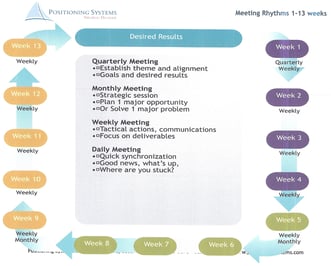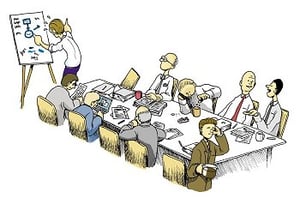 Meetings can be the scourge of an organization, or a catalyst for growth.
Meetings can be the scourge of an organization, or a catalyst for growth.
As Scale Up coaches, we adhere to foundational meeting rhythms established based on best practices and the principles John D Rockefeller used to build Standard Oil into the largest company in the world.
These meeting rhythms follow the pattern shared here. To discover more about ScaleUp Meeting Rhythms visit Leadership Development – Strategic Discipline’s Meeting Rhythms
I recently shared an article on my Facebook and my LinkedIn profile, Your Meetings Are Killing Employees' Best Ideas. It Isn't Your Fault. Here's How to Fix Them.
The author has constructive ideas on how to run meetings to prevent stifling creativity, ideas, conflict, and openness.
In many ways the authors article echoes the principles in Patrick Lencioni’s Five Dysfunctions of a Team. Two blogs that share principles from Lencioni’s book are Leadership Harmony – 5 Dysfunctions of a Team – Conflict Resolution Model and Fundamental Attribution Error – Barrier to Growth. You can discover more on Lencioni and his principles and ideas in 21 other blogs I’ve posted here.
Are Meetings Killing Your Best Ideas
The articles author, Minda Zetlin, Co-author of, The Geek Gap shared four rules in the article, three of which we instruct our leadership teams to follow already. The article reminded me of why we suggest these same rules to govern our meetings.
Zetlin shares why meetings tend to restrict the flow of exchange and ideas. “Groups such as tribes and clans and (but also work teams) often eject individuals who publicly disagree with the group's leaders or its universally held beliefs. Humans are not well adapted to survive all alone, so in many times and places this rejection by the group could prove fatal. For most of history it actually has been safer to be wrong in a group than right by yourself. In many situations, that's still true today.
Members show their affinity to the group by restating and confirming what other group members, and especially group leaders, have already said. Even those with important and pertinent information to share tend to forget that information or dismiss it as not really relevant in their eagerness to show their solidarity with the group and its views. They also set aside their own insights and focus on how to assist in the group's chosen course of action. This is such a profound human instinct that most of us do it without realizing it.”
 This last paragraph is why many of my customers have me lead their weekly leadership meetings. We shared some of the restrictive elements in meetings led by the CEO in Leadership Dominance. A leadership team respects and desires the attention and acknowledgment of their leader. When the CEO leads every meeting, dissent, conflict, and disagreement often vacate the discussions. The collective intelligence and brain power in the room can be reduced to just the CEO’s mindset and experience. That’s a recipe for disaster.
This last paragraph is why many of my customers have me lead their weekly leadership meetings. We shared some of the restrictive elements in meetings led by the CEO in Leadership Dominance. A leadership team respects and desires the attention and acknowledgment of their leader. When the CEO leads every meeting, dissent, conflict, and disagreement often vacate the discussions. The collective intelligence and brain power in the room can be reduced to just the CEO’s mindset and experience. That’s a recipe for disaster.
Zetlin points out, the goal shouldn’t be to have highly efficient harmonious meetings at the risk of not finding innovative solutions to problems, or recognizing new threats or opportunities. In leadership meetings there is a tendency for group members to spend more time and energy discussing information all members are already familiar with and less time and energy discussing information only some members are aware of. This is called shared information bias. Zetlin offered what you can do to lessen these effects and increase the chances employees will share more of the good ideas and relevant information they have.
For your next team meeting, follow these simple rules:
- Have people bring notes. (We ask leadership team member to set the meeting agenda up on Google Docs with boxes for each leader. They fill in their info before the meeting and share it.) Metronome Growth Systems’ software offers the same feature.
- Specifically ask for dissenting opinions. (This is a best practice we encourage, just not as stridently as Zetlin suggests, I heartedly endorse her recommendation.)
Zetlin suggests: As a group consensus emerges, pause the proceedings and say something like this: "It sounds like a lot of us agree. But right now, I would like to hear from anyone who has a different view."
- Go around the table. Zetlin shared, “One man who was somewhat shy and would never have volunteered to say anything consistently offered some of the most insightful comments of the whole group. If you're not hearing from every person at a team meeting, you are likely missing valuable information.” (ScaleUp meetings are set up to have everyone participate and go around the table for the Good News, Numbers, and Customer & Employee data sections on the agenda. In Collective Intelligence encouraging participation like Zetlin suggests makes sense.)
- If you're the leader, speak last. This always makes sense since the leader can stifle dissenting views. Read Leadership Dominance to understand why this is critical and why I always ask the leader to speak last in our meetings.
 Could your business improve with more effective meetings?
Could your business improve with more effective meetings?
Do you feel your business can achieve and succeed TO a higher level?
Growth demands Strategic Discipline.
Positioning Systems helps your business grow through the Four Decisions: People, Strategy, Execution, Cash. We’ll help your business achieve Execution Excellence.
Each of the Four Decisions Produces a specific outcome. In our coaching process, we repeat examples and the definitions of the Four Decisions frequently to make sure our customers remember the value and result each decision produces for your business.
|
DECISION |
RESULT/OUTCOME |
|
PEOPLE |
|
|
STRATEGY |
|
|
EXECUTION |
|
|
CASH |
|
If you’re business is failing to achieve industry leading results in any of these areas, that Decision should be your One Thing.
Positioning Systems helps mid-sized ($5M - $250M) business Scale-UP. We align your business to focus on Your One Thing! To achieve growth, you need to evolve in today’s rapidly changing economic environment. Are you avoiding a conversation with yourself on how to can successfully grow your business? Contact dwick@positioningsystems.com to Scale Up your business! Take our Four Decisions Needs Assessment to discover how your business measures against other Scaled Up companies. We’ll contact you.
Next Blog – An The Outthinker Process Example
Last week Tuesday, Kaihan Krippendorff was in Destin Florida, presenting the final step in the Outthinker Process to one of my customers. Over the next several blogs I will share the journey we followed through the five outthinker steps to get you more acquainted with the results your business can produce as well, to help innovate and strategize for your future.






.jpeg?width=150&height=135&name=Hand%20with%20marker%20writing%20the%20question%20Whats%20Next_%20(1).jpeg)

